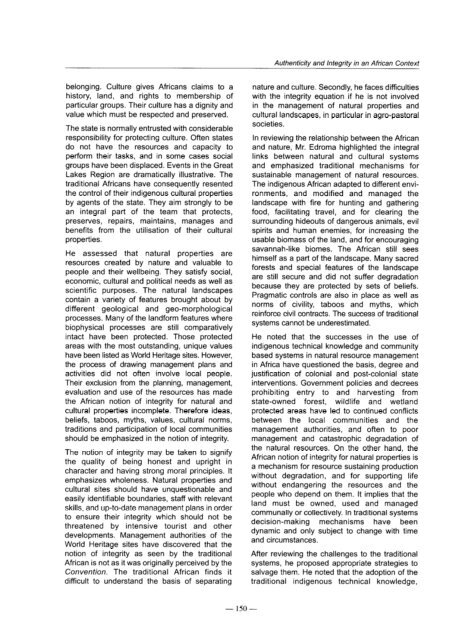Mul - unesdoc - Unesco
Mul - unesdoc - Unesco
Mul - unesdoc - Unesco
Create successful ePaper yourself
Turn your PDF publications into a flip-book with our unique Google optimized e-Paper software.
elonging. Culture gives Africans claims to a<br />
history, land, and rights to membership of<br />
particular groups. Their culture has a dignity and<br />
value which must be respected and preserved.<br />
The state is normally entrusted with considerable<br />
responsibility for protecting culture. Often states<br />
do not have the resources and capacity to<br />
perform their tasks, and in some cases social<br />
groups have been displaced. Events in the Great<br />
Lakes Region are dramatically illustrative. The<br />
traditional Africans have consequently resented<br />
the control of their indigenous cultural properties<br />
by agents of the state. They aim strongly to be<br />
an integral part of the team that protects,<br />
preserves, repairs, maintains, manages and<br />
benefits from the utilisation of their cultural<br />
properties.<br />
lie assessed that natural properties are<br />
resources created by nature and valuable to<br />
people and their wellbeing. They satisfy social,<br />
economic, cultural and political needs as well as<br />
scientific purposes. The natural landscapes<br />
contain a variety of features brought about by<br />
different geological and geo-morphological<br />
processes. Many of the landform features where<br />
biophysical processes are still comparatively<br />
intact have been protected. Those protected<br />
areas with the most outstanding, unique values<br />
have been listed as World Heritage sites. However,<br />
the process of drawing management plans and<br />
activities did not often involve local people.<br />
Their exclusion from the planning, management,<br />
evaluation and use of the resources has made<br />
the African notion of integrity for natural and<br />
cultural properties incomplete. Therefore ideas,<br />
beliefs, taboos, myths, values, cultural norms,<br />
traditions and participation of local communities<br />
should be emphasized in the notion of integrity.<br />
The notion of integrity may be taken to signify<br />
the quality of being honest and upright in<br />
character and having strong moral principles. It<br />
emphasizes wholeness. Natural properties and<br />
cultural sites should have unquestionable and<br />
easily identifiable boundaries, staff with relevant<br />
skills, and up-to-date management plans in order<br />
to ensure their integrity which should not be<br />
threatened by intensive tourist and other<br />
developments. Management authorities of the<br />
World Heritage sites have discovered that the<br />
notion of integrity as seen by the traditional<br />
African is notas it was originally perceived by the<br />
Convention. The traditional African finds it<br />
difficult to understand the basis of separating<br />
- 150-<br />
Authenticity and lntegrity in an African Context<br />
nature and culture. Secondly, he faces difficulties<br />
with the integrity equation if he is not involved<br />
in the management of natural properties and<br />
cultural landscapes, in particular in agro-pastoral<br />
societies.<br />
In reviewing the relationship between the African<br />
and nature, Mr. Edroma highlighted the integral<br />
links between natural and cultural systems<br />
and emphasized traditional mechanisms for<br />
sustainable management of natural resources.<br />
The indigenous African adapted to different envi-<br />
ronments, and modified and managed the<br />
landscape with fire for hunting and gathering<br />
food, facilitating travel, and for clearing the<br />
surrounding hideouts of dangerous animals, evil<br />
spirits and human enemies, for increasing the<br />
usable biomass of the land, and for encouraging<br />
Savannah-like biomes. The African still sees<br />
himself as a part of the landscape. Many sacred<br />
forests and special features of the landscape<br />
are still secure and did not suffer degradation<br />
because they are protected by sets of beliefs.<br />
Pragmatic controls are also in place as well as<br />
norms of civility, taboos and myths, which<br />
reinforce civil contracts. The success of traditional<br />
systems cannot be underestimated.<br />
He noted that the successes in the use of<br />
indigenous technical knowledge and community<br />
based systems in natural resource management<br />
in Africa have questioned the basis, degree and<br />
justification of colonial and post-colonial state<br />
interventions. Government policies and decrees<br />
prohibiting entry to and harvesting from<br />
state-owned forest, wildlife and wetland<br />
protected areas have led to continued conflicts<br />
between the local communities and the<br />
management authorities, and often to poor<br />
management and catastrophic degradation of<br />
the natural resources. On the other hand, the<br />
African notion of integrity for natural properties is<br />
a mechanism for resource sustaining production<br />
without degradation, and for supporting life<br />
without endangering the resources and the<br />
people who depend on them. It implies that the<br />
land must be owned, used and managed<br />
communally or collectively. In traditional systems<br />
decision-making mechanisms have been<br />
dynamic and only subject to change with time<br />
and circumstances.<br />
After reviewing the challenges to the traditional<br />
systems, he proposed appropriate strategies to<br />
salvage them. He noted that the adoption of the<br />
traditional indigenous technical knowledge,

















